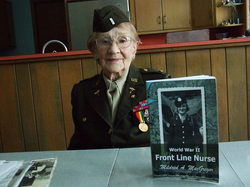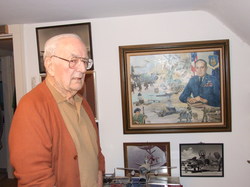"Detroit: Our Greatest Generation" features several Ann Arbor residents who served in World War II
Emmy-winning producer Keith Famie believes World War II marked the height of patriotic sentiment in America. And if the country's wartime mobilization was impressive, Southeast Michigan's efforts were extraordinary, Famie said.
On Sunday, Famie will honor the area's contributions in World War II when his latest documentary, "Detroit: Our Greatest Generation," premieres at the Fox Theater in Detroit.

Courtesy, Visionalist Entertainment Productions
Famie took up the project about 14 months ago, disturbed by the rate at which World War II veterans are dying. Even though Famie's difficulty in lining up financing caused "Our Greatest Generation" to twice be denied for Michigan film incentive credits, Famie said waiting for the paperwork to clear wasn't an option in his eyes.
"We're losing 1,500 World War II veterans every week in America," Famie said. "Just last week in Michigan, we lost 25. I knew that if I didn't move fast, I'd be losing out on so many valuable stories, so much history."
She made life-and-death decisions
Several of those stories belong to Ann Arbor's Mildred A. MacGregor, 97. She was a front-line nurse with the 298th General Hospital, a unit staffed with medical professionals from the University of Michigan Hospital.Â
MacGregor held a front-row seat for many of the famous battles of World War II. She nursed soldiers wounded in D-Day and helped save the lives of soldiers at the Battle of the Bulge and victims of the Buchenwald concentration camp.
As a triage nurse, MacGregor - then Mildred Radawiec - was given the grave task of determining which wounded American soldiers merited further medical attention and which were too badly injured to make it. Those soldiers were given just enough morphine to make their last hours on earth bearable.

Mildred MacGregor, World War II front line nurse and author.
James Dickson | AnnArbor.com
After the war, MacGregor's focus shifted to raising a family of three children.
But for decades, she continued to send letters to surviving members of the 298th every year on June 6, the anniversary of D-Day. And on the 50th anniversary of D-Day, MacGregor returned to France.
In December 2008, MacGregor’s memoir, “World War II Front Line Nurse,” was published by the University of Michigan Press. MacGregor had self-published the memoir in June 2007 and sold about 300 copies on her own before U-M Press picked it up.
Despite serving in Europe and North Africa, it is MacGregor’s short time with a fellow Ann Arbor native that stands out as her proudest moment of service.
The severely-wounded young man asked where his nurse was from.
“Ann Arbor,” she told him.
“Me too,” he said.
MacGregor usually tried to avoid looking at the names of the men she nursed - knowing their names would make it too tough to do her job - but in this case, she went out of her way to remember. She wrote down the young man’s name - Merle Heusel - and caught up with his family when she returned to Ann Arbor.
“Sixty-two million men lost their lives during World War II. There was no salvation anywhere,” MacGregor said. “But Hitler’s evils can’t be underestimated - I’m just glad I could do my part for America.”
His short stroll was the start of a long career
Major General Richard Bodycombe (Ret. Air Force), 87, never thought of himself as a member of the "Greatest Generation" until Tom Brokaw's book by the same name. But the title fits just the same, Bodycombe said.
Bodycombe, a former University of Michigan baseball player, was hanging out with friends in East Quad's Prescott House dormitory in December 1941 when he heard a ruckus down the hall.
"We've been attacked! We've been attacked!" Bodycombe's hallmates shouted, banging on doors to alert fellow students the Japanese had attacked the U.S. naval base at Pearl Harbor.
Soon thereafter, Bodycombe received a draft notice. That next Labor Day, he found himself awaiting assignment at an induction station in Detroit with two others from the baseball team.Â
"We went down to join the Marines," Bodycombe said, "but I was the only one who wasn't inoculated with the Halls of Montezuma."

Major General Richard Bodycombe stands before his retirement mural. Bodycombe flew for more than 22,000 flight-hours in the Air Force and as chief pilot for the Ford Motor Company.
James Dickson | AnnArbor.com
Heat from the induction center forced Bodycombe to take a short stroll around to clear his head. The young man happened upon a sergeant.
"Did you come down here to enlist?" the sergeant asked. The young man said yes. "Come with me," the sergeant said.
When they got to the office of the Army Air Corps, a captain showed Bodycombe his pilot's wings. A half-hour later, Bodycombe was signed onto the Army Air Corps.
His teammates got their assignment with the Marines - playing baseball to entertain fellow Marines set to deploy. But for Bodycombe, World War II was the start of a career above the clouds. He only stopped flying five years ago, 22,000 flight hours later, at the age of 82.
"I'm only 84 because of the three years I spent flying planes," Bodycombe joked.
During the war, Bodycombe flew 19 missions over Austria, including one crash-landing in the former Yugoslavia. More than a few times, his unit needed the cover of the Tuskegee Airmen, a highly-skilled group of black pilots, he said.Â
"We could rely on them. They showed up on time and fought hard every time - that's about the biggest compliment I can give," Bodycombe said.
In the summer of 1948, Bodycombe got a letter from the Air Force, asking whether he'd like to come back to active duty and fly a B-24 for the Berlin Airlift, dropping off coal and flour to Germans west of the Berlin Wall.
Bodycombe was a history teacher and a multi-sport coach when he got the offer. Teaching offered $550 a month; re-joining the Air Force as a 1st Lieutenant paid $575 a month. Bodycombe took the higher-paying Air Force gig and never looked back.
By the time Bodycombe retired in 1982, he had served as the chief of the Air Force Reserves and as the chief pilot for Ford Motor Company.
These days, Bodycombe spends his time helping out at the Yankee Air Museum at the Willow Run Airport.
In his last public speech, a Memorial Day address to a group of veterans at the Yankee Air Museum, Bodycombe sounded his displeasure with the lack of sacrifice on display in a nation currently engaged in two wars.
"We're not at war," Bodycombe said to the veterans. "The Army and the Marines are the only ones that are at war."
Bodycombe was asked to speak again the next year, but declined. "I'm not giving any more speeches," he said. "I'm retired."
Famie's labor of love
MacGregor and Bodycombe's stories will be told Sunday when "Detroit: Our Greatest Generation" premieres at the Fox Theater in Detroit at 7 p.m.
One of Famie's greatest regrets is he never got his father, a World War II veteran, on camera to share his experiences. Famie amassed about 80 hours of footage for the documentary.
Tickets are still available through Ticketmaster or the Fox box office, for $23 or $33.
Famie - an award-winning chef, former "Survivor" contestant and host of "Keith Famie's Adventures," on the Food Network - said he's still in the red on "Our Greatest Generation," but the subject matter justifies the sacrifice. The Fox Theater premiere was made possible through the generosity of Bob Gillette, of American House retirement homes.
Next up on Famie's radar is a documentary on Detroit's Vietnam generation. Famie said he hopes his film helps bring local Vietnam vets “in from the cold” and fosters a long-overdue respect for their service.
WDIV-Channel 4 in Detroit will air a one-hour version of "Detroit: Our Greatest Generation," with no commercial interruption, on Dec. 16 at 8 p.m. and again on Christmas Day at 2 p.m.
James David Dickson reports on human interest stories for AnnArbor.com. He can be reached at JamesDickson@AnnArbor.com, or Twitter.com/JamesDDickson.


Comments
JH
Mon, Dec 14, 2009 : 10:10 p.m.
I am related to Merle Heusel and have held his purple heart in my hands. I am very close to his sister Beatrice, she is living in Florida and will be in Ann Arbor this week. I read her these post and she would very much like to know if the post by WW II Veteran could contact me, she would like to speak to you about her brother. I will check the posts in the next couple of days, hoping for a response.
packman
Mon, Dec 14, 2009 : 9:26 a.m.
I attended this film premiere last evening...fantastic...the Fox Theater was nearly full. Watch it on Channel 4 on Wednesday!
Curt Phillips
Sun, Dec 13, 2009 : 3:49 p.m.
These are stories well worth telling and preserving for the future. I wish my old friend Howard DeVore of Dearborn Heights could have been interviewed for this. Howard was a ball-turret gunner on a B-17 with the 8th Air Force during WWII and had some incredible stories to tell. Sadly, he passed away just a couple of years ago and probably took some of his best stories with him. But I was lucky to have been his friend. There is indeed something special about the men and women of Howard DeVore's generation. In the years of our nation's greatest peril we were blessed that they stood ready to fight to save freedom for all of us who came after them.
WW II Veteran
Sun, Dec 13, 2009 : 12:42 a.m.
I was very moved reading this story..Merle Heusel and I grew up together on West liberty Street I attended Merle's Funeral when his body was brought home. I was one of the fortunate ones to come home alive.
cinnabar7071
Sat, Dec 12, 2009 : 8:22 p.m.
Right on PackMan, I wished we fought wars to win now a days. Those guys back then had brass balls. My uncle was in WW2, and I never tired of his storys.
packman
Sat, Dec 12, 2009 : 1:09 p.m.
Gen Dick Bodycombe is right on the mark! "We" are not at war...our troops are! "We" have not made any sacrifices to pay for the war effort as did the families of the greatest generation...war bonds, can collections, gas rationing, food rationing, Victory gardens. I also don't believe there was much in the way of "PC" for those who would kill us or apologetic speeches to the world by the Commander in Chief. On the other hand Al Gore had not yet invented the internet and its instant communication. When out soldiers went to war, they stayed until it was over. Times have changed
djm12652
Sat, Dec 12, 2009 : 12:19 p.m.
To all of the Veterans I CAN say only one thing...a profound THANK YOU!
aareader
Sat, Dec 12, 2009 : 11:17 a.m.
Tom Brokaw was right. This group was the greatest generation. When they came back from the wars and entered the workplace, government, etc. this country beneficed from their world perspective. They were unselfish and did things for the good of people and country. I salute you.
Darcy Guyton-Hanna
Sat, Dec 12, 2009 : 10:19 a.m.
Without these brave people stepping up, we would be speaking a different language!